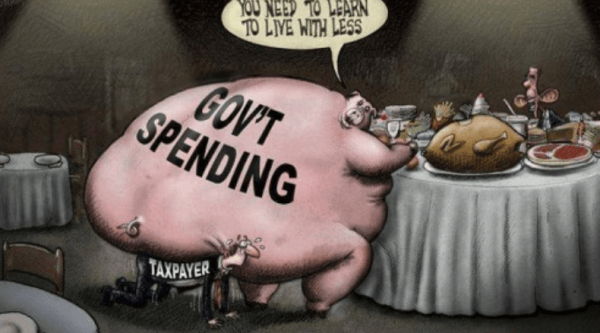In the wee hours of the morning, the US Senate passed a massive spending bill that would avert a government shutdown. The US House quickly passed its own legislation. Unlike many previous agreements, the current agreement aims to keep the lights on for an extended period of time: 2 years, to be exact. Yet while many Republicans have long championed prudent spending, the 2-year deal would see the American government spending 500 billion more dollars over the next few years.
Most of this extra spending isn’t being paid for with cuts elsewhere. This means the bill will simply be added to the United States’ already ballooning public deficit. With extensive tax cuts having recently been passed, America’s public debt was already projected to rise absent extensive cuts.
Indeed, the Congressional Budget Office estimates that the tax cuts alone will raise debt levels by $1.8 trillion dollars over the next ten years. Early CBO estimates point to the current spending agreement adding another $320 billion over the next few years.
What does all of this mean? It means that Congress and the federal government continue to kick the can further down the road. The Social Security Trust Fund is essentially a folder of IOUs from Uncle Sam. Meanwhile, the ever-exploding deficit promises to be a burden for future generations. What is borrowed today must be paid someday, and believe it or not, someday eventually comes.

When Obama was in office, Republicans acted like every dollar spent was a dollar wasted. Democrats, meanwhile, proclaimed that deficit increases were only in response to the recession. Now, we’re seeing the true colors of both parties. They simply don’t give a damn about deficits and debt.
The legislation represents a compromise between Republicans and Democrats. However, as is often the case, the compromise is simply a mash-up of the worst aspects of both parties. Fiscal conservationism, or even simple restraint, was tossed to the wind in order to fund the pet projects of both sides.
As Republican Senator Rand Paul has pointed out:
“When the Democrats are in power, Republicans appear to be the conservative party. But when Republicans are in power, it seems there is no conservative party. The hypocrisy hangs in the air and chokes anyone with a sense of decency or intellectual honesty.”
Military Spending Is Great, But Someone Has to Foot the Bill
The military is getting an extra 10 percent, with its budget rising from $634 billion to $700 billion in 2018 and $716 billion in 2019. Certainly, Americans can and should have the best military that money can buy. However, that military also has to be affordable. If we continue to bury ourselves in debt to fund military operations, we risk weakening ourselves overall. Our economy has to be able to support and pay for our military.
This is especially relevant in light of alleged waste at the Pentagon. Previously, the Pentagon worked with the “Defense Business Board,” a collection of McKinsey executives and consultants, to examine waste. The Board reported in January of 2015 that the Pentagon could reduce $125 billion dollars’ worth of waste over five years simply by streamlining bureaucracy as workers retired or left service (none would be laid off).
Instead of acting on the recommendations, the military’s leadership tried to quietly bury the report. The report was brought to light, but the military has done little to address the issues.
America needs a strong military, there can be no doubt. Tensions between Russia and China have increased in recent months. Islamic extremism remains a serious risk even if the Islamic State has been dismantled. Iran continues to increase its influence in Iraq and across the region.
Yet at the same time, America is not involved in any standing wars. While America must always be prepared for war, spending wartime sums during peacetime may worsen America’s preparedness for war, if anything. Already buried under debt, how will America cope with the next multi-trillion-dollar war, should one come to pass?

Eventually, lenders are going to start to wonder where the money is coming from. American T-Bills remain attractive, but for how long?
Further, shouldn’t the Pentagon first figure out how to streamline its current bureaucracy and how to invest prudently in military technology that will yield results? Will extending more funding to the military simply increase waste? These questions should at least be asked, if not answered.
“Historic” Increase in Non-Defense Spending
It’s not just the military that will be receiving massive handouts under the agreement. Non-defense domestic programs will enjoy a “historic” 10 percent increase. In the first year, spending would rise by $60 billion. In year 2, that jumps to $78 billion. College affordability, infrastructure, child care, and healthcare would all be addressed.
About $7 billion would go to community health centers across the country. These centers currently provide care to roughly 26.5 million Americans. The Department of Veterans Affairs would also receive an extra $2 billion per year.
Disaster (hurricane) relief would be another big winner. $90 billion is being set aside to aid Puerto Rico, the US Virgin Islands, Texas, and Florida. $16 billion would head to Puerto Rico alone. These areas have been ravaged by natural disasters, so it’s hard to blame Congress for wanting to lend a helping hand.
The legislation doesn’t even pretend to be fiscally responsible. Congress has acted like a bunch of kids buying themselves every toy they want on credit.
Hopefully, these rebuilding efforts won’t be as wasteful as past efforts. Back in 2006, the Government Accountability Office (GAO) found that millions were wasted. Scams, double payments, unused mobile homes, and other issues were cited. The GAO and other auditors concluded that FEMA was woefully unprepared.
Given the general neglect and lack of leadership at FEMA, it’s unlikely that the issues have been resolved.
Who’s Going to Pay? (Future Generations)
I support all of the above causes, for the record. I support a strong military as well. However, we also need to be fiscally responsible. The legislature doesn’t even pretend to be fiscally responsible. Congress has acted like a bunch of kids buying themselves every toy they want on credit. No one is discussing how this shopping spree is going to be paid for.
As with the rest of the debt piling up on America’s books, Congress can’t really explain how the most recent spending bonanza will be paid for. The reality is rather simple: either the debt won’t be paid (likely ushering in a period of massive economic instability), or future generations are going to have to foot the bill. That means much higher taxes, sharply reduced public services, and other sacrifices.

Is it really fair to spend money today, expecting someone else to pay for it tomorrow? The Republican Party has been proclaiming itself the party of fiscal responsibility in recent years. Yet the legislation suggests that Republicans are far from willing to tighten their belts.
















